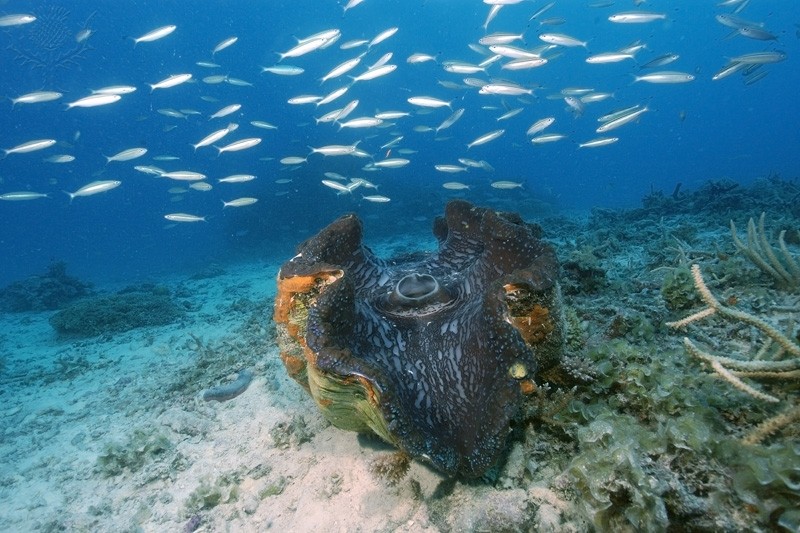Giant Clam
Lucas Clarke
DESCRIPTION:
The Giant Clam is the largest living bivalve mollusk. T.gigas is one of the most endangered clam species. One of a number of large clam species native to the shallow Coral Polyp of the south Pacific and Indien oceans, they can weigh more than 200 kilograms (440lb), measured as much as 120cm (47in) across, and have an average lifespan in the wild of 100 years or more.They are also found off the shores of the Philippines, where they are called Taklobo, and in the South China Sea in the coral reefs of Sabah.

HABITAT:
The largest of all molluscs, the giant clam prefers the warm waters around Australia's Great Barrier Reef. T.gigas live in flat coral sand or broken coral and can be found at depth of at much as 20 m (66ft). Its range covers the info-Pacifique, but populations are diminishing quickly and the giant clam has become extinct in many areas where it was once common. It can be found in high or low islands, lagoons or fringing reefs. Its rapid growth rate is likely due to its ability to cultivate Algae in its body tissue.
PREDATOR ADAPTATION:
Ridacna Gigas consume proteins and sugars from the algae which live on their mantle. They eat this by sucking in the water and filtering it through their gills which are also used to obtain oxygen.
PREY ADAPTATION:
- The Giant Clam closes its shell when it detects a predator by noticing the change of light.
- The shell of the Giant Clam has 4 to 6 folds that make it appear wavelike, These can fool predators into believing that it has teeth.
- The Giant Clam slowly closes its halves together, to protect its vulnerable parts from predators.
- The Giant Clam is so well protected that it has few animal predators, though some humans consider its muscle a delicacy, which places it on the Endangered Species list.

SYMBIOSIS:
The giant clam has a Mutual Symbiosis with Algae. The Algae benefits from the Giant Clam because they has a safe place to live, and get all the sunlight they need when the clam is open. The Giant Clam benefits from the Algae because it eats what the Algae produces. If the Algae dies the Clam will die eventually too.

SPECIES COMPARISON:
HERMIT CRAB:
Similarities:
- They tend not to live in close proximity to others of their species.
- They both use shells for protection against predators.
Differences:
- The Hermit Crab can live in the ocean, tide-pools, and on land whereas the Giant Clam can only live in the ocean.
- The Giant Clam is a bivalve mollusk and the Hermit Crab is a crustacean.
- The Hermit Crab borrows its shell whereas the Giant Clam grows its own shell.
- The Giant Clam has one "foot" and can not move once it has found its home in the ocean whereas the Hermit Crab has five pairs of legs(but all are not fully developed.

Click here to return to FrontPage
RESOURCES:
Giant Clam. Darwin reef.ca. May 27 2013
Giant Clam. wikipedia.ca May 24 2013
Giant Clam. National Geographic.com May 27 2013
Giant Clam Photography. Britannica Encyclopedia